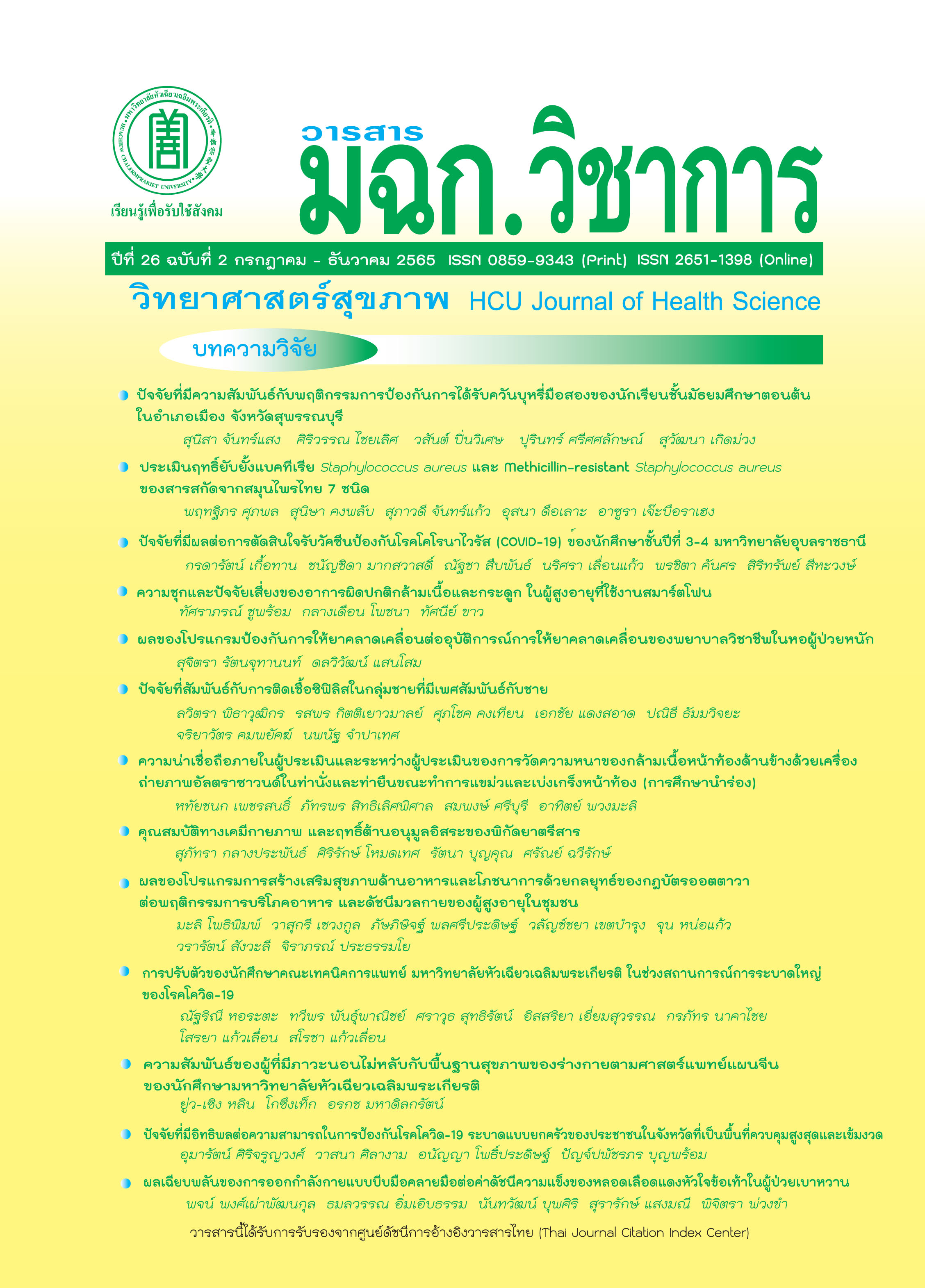The Relationship of Insomnia and TCM Constitution in Huachiew Chalermprakiet University Students
Keywords:
Insomnia, Sleep Quality, Constitutions, TCMAbstract
Insomnia is the most common related health problem, which affects memory, creativity, and ability to learn. This research will study the relationship of insomnia and the Traditional Chinese Medicine (TCM) Constitution in groups of 113 Huachiew Chalermprakiet University students by using questionnaire data collection. Information was randomly collected from each class of students who filled in the questionnaires by themselves. These questionnaires include general personal information and health awareness assessment forms such as general health assessment questionnaires, stress assessment form, Pittsburgh Sleep Quality Index (PQSI), and TCM constitution questionnaire to analyze the relationship of people with insomnia and the basics of physical health according to TCM among students. Aim to refer to further teaching and guidelines for students with insomnia.
The results of the study showed the relationship between TCM constitutions of the sample and the quality of sleep was significant (F= 2.196, p=0.013) and the top 5 groups most likely to have insomnia or having poor sleep quality had Qi-deficiency, Special, Qi-depression, Yin-deficiency, and Dampness-heat constitutions, while the balanced constitution had relatively good sleep quality. Also, it was found that the special constitution group was top-ranked for insomnia, which had never been seen in previous reviews of the literature. This may be due to different locations, which make everyone’s basics of physical health different.
Downloads
References
World-Sleep-Society. World sleep day 2021 [Internet]. World Association of Sleep Medicine (WASM) and World Sleep Federation (WSF) 2021 [cited 2021 Mar 19]. Available from: https://worldsleepday.org/usetoolkit/talking-points
Singh P. Insomnia: A sleep disorder: Its causes, symptoms and treatments Pahul. Int J Med Heal Res. 2016; 2(10):37–41.
Gaultney JF. The prevalence of sleep disorders in college students: Impact on academic performance. J Am Coll Heal 2010;59(2):91–7.
Arayasinlapathon N, Somkumlung P, Seelawut J, Phoobunerb J, Mulmuangsaen J. Factors affecting sleep quality among nursing students in one college of nursing. Journal of Phrapokklao Nursing College. 2017;28(1):1–13. (in Thai)
Zhou Z. Five-Year” National planning textbook for general higher education: Chinese medicine internal medicine. Beijing: Traditional Chinese Medicine Press.; 2007. p.154-5. (in China)
Yan Y, Hong XZ, Rui L. Emotional “to” insomnia and emotional “treatment” insomnia. J Liaoning Tradit Chinese Med 2008;10(9):58-9. (in China)
Wei T. Theory analysis of disharmony of stomach leads to insomnia. Jiangsu J Tradit Chinese Med 2015;47(5):11-3. (in China)
Wang Q, Sheng Z. TCM physique theory. Beijing: People’s Medical Publishing House; 1982. (in China)
Xuan L, Qi W. Suggestion and analysis on revise of standard of classification and determination of constitution in TCM. J Beijing Univ Tradit Chinese Med 2013;36(5):300-4. (in China)
Pei QH, Tang QSh, Li X, ZHeng Q, Zhu ChJ, Nie XW. Research on sleep quality, personality characteristics and life quality of outpatient suffering insomnia. China J Tradit Chinese Med Pharm 2014;29(3):927–9. (in China)
Peng X, Han J, Ning Y, Lin Q, Pan M, Zhong Y, et al. TCM constitution analysis and nursing countermeasures of elderly insomnia patients. Chinese Gen Pract Nurs 2013;11(5):1157–8. (in China)
China Association of Chinese Medicine. Classification and determination of constitution in TCM. World J Integr Tradit West Med 2009;4(4):303–4. (in China)
Yang J, Zhu J, Wu S, Li J, Wang M, Lu Y. Correlation between traditional Chinese medicine constitution and sleep quality among medical students. J Anhui Univ Chinese Med 2019;38(6):16–20. (in China)
Cheng L, LI Zh, ZHang W, ZHao M. Correlation between insomnia and types of traditional Chinese medicine constitution in college students. Chinese J Sch Heal 2018;39(10):1499–501. (in China)
Shi X, Guo M, Liu L, Feng H, Cheng R, Li K, et al. Investigation and logistic regression analysis of TCM constitution of 135 insomniacs. J Shanxi Coll Tradit Chinese Med 2018;19(5):5–11. (in China)
Zhang J, Liu L. Treating Insomnia with Qi deficiency. J Hubei Univ Natl • Med Ed 2018;35(2):79–83. (in China)
Liu X, Zhang G. Investigation to the life style of college students with Qi deficiency. Sport Sci Technol 2016;37(3):94–5. (in China)
Somdee P, Pongchaturawit Y, Chaimongkol N. Symptomatic preventive behavior of allergic rhinitis in school-age children and its related factors. In: National and International Conference Interdisciplinary Research for Local Development Sustainability: 15th Graduate Studies of Northern Rajabhat University Network Conference. 2015 Jul 23; Nakhon Sawan Rajabhat University. Nakhon Sawan: Nakhon Sawan Rajabhat University; 2015. p.109–23. (in Thai)
Piboonworakulkij R, Kongsaktrakul C, Santati S. Factors predicting sleep quality of secondary school students in Bangkok, Thailand. J Nurs Sci Chulalongkorn Univ 2019;31(2):60–71. (in Thai)
Jiang J. Insomnia due to depression syndrome. Shanghai J Tradit Chinese Med 2016;50(7):5–14. (in China)
Liao Y. Discussion treating Insomnia of the pattern of dampness-heat. Chinese community Doctors. 2011;34(13):146–7. (in China)
National Statistical Office. The 2017 Food Consumpton Behavior Survey. [Internet]. 2018 [cited 2018 Jan 23]. Available from: https://www.nso.go.th/sites/2014/DocLib13/ด้านสังคม/สาขาสุขภาพ/Food_consumption_behavior_of_the_population/2560/ /รายงานฉบับสมบูรณ์.pdf (in Thai)
Downloads
Published
How to Cite
Issue
Section
License
Copyright (c) 2022 HCU Journal

This work is licensed under a Creative Commons Attribution-NonCommercial-NoDerivatives 4.0 International License.
บทความที่ได้รับการตีพิมพ์เป็นลิขสิทธิ์ของวารสารวิทยาศาสตร์สุขภาพและสุขภาวะ
ข้อความที่ปรากฏในบทความแต่ละเรื่องในวารสารวิชาการเล่มนี้เป็นความคิดเห็นส่วนตัวของผู้เขียนแต่ละท่านไม่เกี่ยวข้องกับมหาวิทยาลัยหัวเฉียวเฉลิมพระเกียรติ และคณาจารย์ท่านอื่นๆในมหาวิทยาลัยฯ แต่อย่างใด ความรับผิดชอบองค์ประกอบทั้งหมดของบทความแต่ละเรื่องเป็นของผู้เขียนแต่ละท่าน หากมีความผิดพลาดใดๆ ผู้เขียนแต่ละท่านจะรับผิดชอบบทความของตนเองแต่ผู้เดียว




